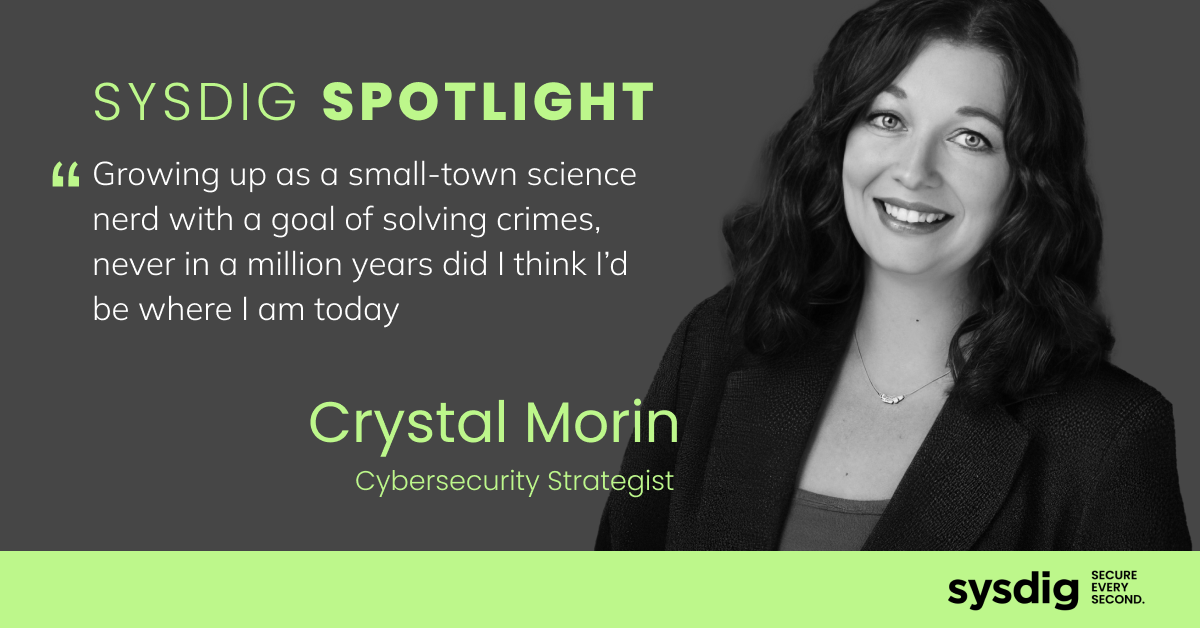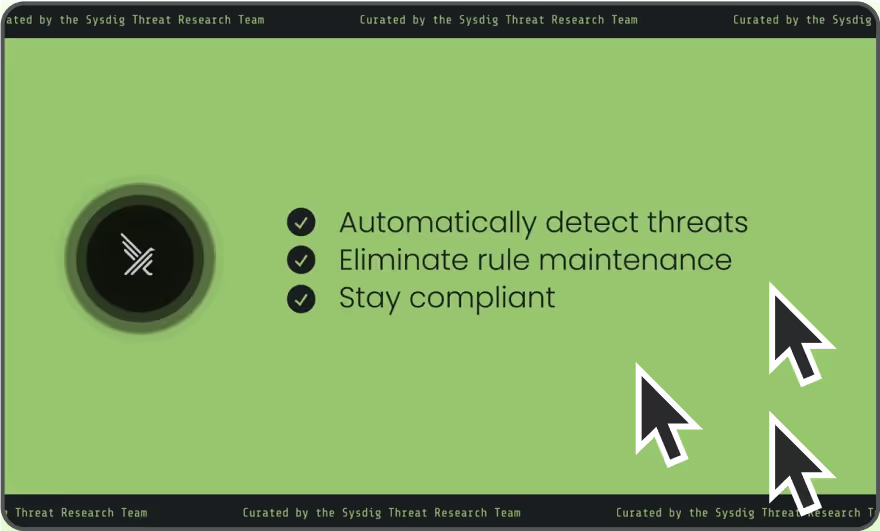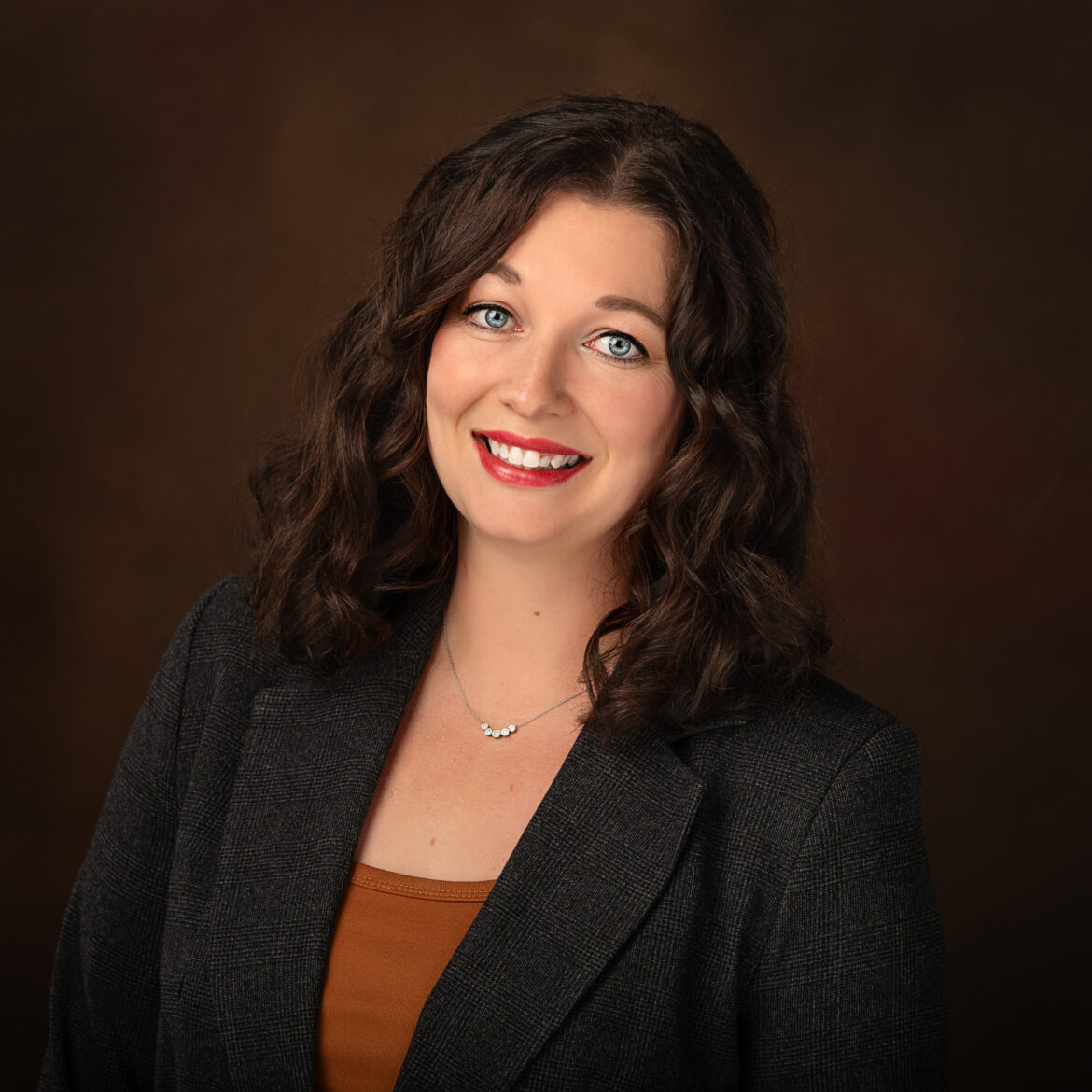
Falco Feeds extends the power of Falco by giving open source-focused companies access to expert-written rules that are continuously updated as new threats are discovered.

Growing up as a small-town science nerd with a goal of solving crimes, never in a million years did I think I'd be where I am today. I always had a passion for math and science when I was in high school. For that reason, I went to college for forensic science. The television show CSI was also wildly popular when I was younger, so that might have played into my desire to work in a crime lab, doing ballistics or blood spatter analysis. For many reasons, that didn't work out. I dropped out of school and joined the Air Force.
When I joined the military, I knew I wanted to find a position that prepared me for a lifelong career. Among my top choices were legal and pharmacy, but once again, my plans didn't work out. The Air Force had greater needs at the time. I trained to become an Arabic linguist.
That training was one of the hardest and most stressful things I've ever accomplished in my life (other than being yelled at by instructors in basic training, that wasn't fun either!). Language school consisted of 8-10 hour days, for more than a year, in my target language. In my military career, I was very fortunate to learn and be a part of several aspects of the intelligence cycle, and I believe this helped me become a strong writer and analyst. I intentionally made choices that slowly transitioned me from active duty to national guard, and then to defense contractor before making my way out of military and government service completely. This allowed me to start a family and go to school while maintaining my career.
A surprise in my military career was the importance of writing.
"I didn't love English class or literary theory as a kid. I liked facts. Fortunately, a great deal of my military career was disseminating intelligence based solely on fact — there was no flowery language or opinions, and assumptions had to be made painstakingly clear."
I realized at that point in my career how much I loved data and intelligence-driven writing. And I was good at it, to the point where I was teaching others how to write intelligence reports and became responsible for editing their work. I also became quite good at resume writing and editing at this point too!
I loved my experiences as a linguist and intelligence analyst because it was such a small and niche community. In fact, I never pictured myself leaving that world. I completed a Bachelor's degree and a Master's degree with this in mind, in Middle East Studies and Global Security respectively. I take great pride in the work I did supporting national security strategy and I miss it terribly, but I still carry the same passion for sharing information and securing infrastructure from cyber actors.
The transition from counterterrorism to cybersecurity
I didn't just jump from counterterrorism to cybersecurity. I was provided with opportunities to support cyber threat intelligence missions that helped me transition and learn how cyber threat actors work. An unsuspecting jump in my career was when I left the Intelligence Community for a threat-hunting team that Booz Allen Hamilton was standing up. This came to me thanks, in large part, to a former coworker who knew I was simply a good analyst. He knew I didn't know how to write detection analytics or what Windows event logs meant, but he knew I could learn, research, and analyze unknowns.
I learned the most from questioning, mentoring, and training others during that time. I shared my previous experiences many times over with new college graduates and other employees looking to work in the cyber threat intelligence field. I taught developers, threat hunters, engineers, and more where to find cyber intelligence, how to parse it into usable information, and how to pull pertinent information into a detection analytic. Oftentimes, I was asked questions that I didn't have the answers to because they understood the technical details of how a Windows environment worked better than I did. I would do research and ask questions of others to better answer their questions over time.
"I've realized something at Sysdig that I never realized before my move from the Threat Research Team to the Office of Cybersecurity Strategy, and that is: people listen to what I have to say. That blows my mind."
My Path to Sysdig
I began casually looking and applying to new positions with my newfound cyber knowledge and strong analysis background. The Threat Research Team at Sysdig recognized my abilities and brought me on. This was the greatest and scariest jump in my career. While I was somewhat familiar with cloud threats and environments, containers and Kubernetes were a whole new world for me. I was, however, able to apply my analytical skills and help the team uncover and expose novel cloud attacks.
Reflecting on my career, I realize I've always been heard. When I know what I am talking about and I show my passion, people listen. It explains why I've always been a leader, a mentor, and a trainer. I thought I was just doing my job.
I've always made intentional choices in my career to learn something new, better myself, and provide for my family. I have never stopped learning. I've been going through formal school or training, or grasping new concepts for over a decade.
I know where I fit. I love what I do and I am passionate about uncovering facts and helping others stay safe from bad guys — I guess I always have been, I just didn't know it at the time.
Career Insights: My Lessons to Live By
I have a few pieces of career advice that I always share with anyone who will listen:
- Find what you are passionate about. Those who take a job to collect a paycheck will not be happy and will not thrive. It may be cliché, but follow your heart, take the risks, and you will find happiness in your career.
- Never stop learning. Our world has not stopped evolving since the dawn of time. It doesn't matter if it is a new skill set, concept, formal education, or informal training. Understanding a greater number of the peripherals of your passions and your career will help you grow.
- Be confident. Be confident in what you know and what you are passionate about and share your knowledge with others. They will see your pride and confidence and they will listen to you, I promise.

Crystal is a cybersecurity strategist at Sysdig tasked with bridging the gap between business and security through cloud and container-focused webinars and papers for everyone from executives to technical practitioners.
She was originally a threat research engineer on the Sysdig Threat Research Team, where Crystal spent her time discovering and analyzing cyber threat actors who took advantage of the cloud.


